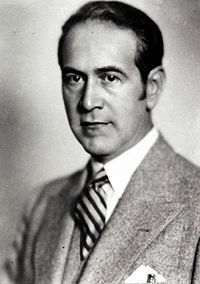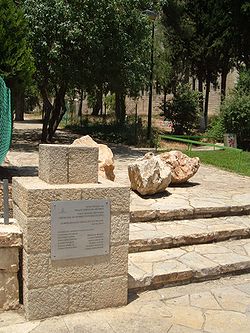- Osvaldo Aranha
-
Osvaldo Euclides de Sousa Aranha 
Personal details Born February 15, 1894
AlegreteDied January 27, 1960 (aged 65) Nationality Brazilian Alma mater Faculdade de Direito do Rio de Janeiro Occupation Member of the Cabinet of Brazil (various positions), President of the U.N. General Assembly Profession politician, diplomat Osvaldo Euclides de Sousa[1] Aranha (February 15, 1894 – January 27, 1960) was a Brazilian politician, diplomat and statesman, who came to national prominence in 1930 under Getúlio Vargas.[2] He is known in international politics for lobbying for the creation of the State of Israel as head of the Brazilian delegation to the UN and President of the UN General Assembly in 1947. [3]
Contents
Life
Osvaldo Aranha was born in Brazil in the city of Alegrete in the state of Rio Grande do Sul. Aranha obtained his bachelor degree in Law and Social Sciences through the Law School of now-called Federal University of Rio de Janeiro (Faculdade de Direito do Rio de Janeiro) in 1916. After his graduation, he returned to the state of Rio Grande do Sul and practiced as a lawyer for eight years, establishing a personal and professional contact with Getulio Vargas, who also was a lawyer. His first public post was that of Assistant Police Commissioner in his native state.
Aranha fought the insurrection of 1923, deflagrated by sectors that opposed the fifth consecutive re-election of Borges de Medeiros as governor of Rio Grande do Sul. By personally commanding an irregular armed force composed by civilians, Aranha fought new uprisings promoted by the opposition in the years that led to the Revolution of 1930.
In a speedy political career, Oswaldo Aranha run for his first elective office in 1926 and was elected Mayor of Alegrete, but soon became a member of the state legislature and later elected to the National Congress in 1928.
When Vargas ran as opposition candidate for president of Brazil in 1930 and lost, Aranha joined with the tenentes to convince Vargas to organize a revolt.[2] When the revolt succeeded, Aranha took the first of several positions in the Cabinet of Brazil under now-President Vargas, heading the Ministry of Finance, the Ministry of Justice, and the Ministry of External Relations, among other positions.[4]
Aranha also served as Ambassador to the United States in 1934 where he gained recognition as a strong supporter of Pan-Americanism. In 1937 He returned to Brazil to head the Ministry of Foreign Affairs. Dr. Aranha played a large role in the Rio de Janeiro Conference of 1942.
Support for Allies in World War II
While serving as Minister of External Relations, Brazil took part in the first three consultative meetings of the Ministers of External Relations of the American Republics which defined Pan-American policy during the early stages of World War II and worked out the recommendation for the collective severance of diplomatic relations with the Axis Powers.[5] During the 1942 Rio conference, he announced that Brazil had cut all diplomatic ties with Nazi Germany, thereby siding with the USA and its Allies. Eventually most Central and South American states did the same, with the exception of Argentina and Chile.
At the first Special Session of the U.N. General Assembly held in 1947, Oswaldo Aranha, then head of the Brazilian delegation to the U.N., began a tradition that has remained until today whereby the first speaker at this major international forum is always a Brazilian.[6]
Honor in Israel
 A plaque commemorating Aranha in 'Aranha square' in Jerusalem
A plaque commemorating Aranha in 'Aranha square' in Jerusalem
Aranha supported and heavily lobbied for the partition of Palestine toward the creation of the State of Israel. Streets in Israeli cities such as Beer-Sheva and Ramat-Gan, and a square in Jerusalem are named after Aranha. in 2007, a street in Tel Aviv was named in his honor at a ceremony attended by his relatives and Brazil's ambassador to Israel.[7]
Controversy
A book by historian Maria Luiza Tucci Carneiro reveals that Aranha was aware of secret circulars asking that Jews be denied entry visas to Brazil and did little to change this.[8] The circular asking for the denial of visas to Jews, however, was not edited by Osvaldo Aranha nor was it made during his term as Minister of External Relations for Brazil. Mário de Pimentel Brandão was responsible for signing this harmful secret circular in 1937 during his term as Minister of External Relations for Brazil. [9]
During Oswaldo Aranha's time as Minister for External Relations, from 1938-1944, many Jews were granted visas to Brazil - despite the circulars. In 1939, Jews were granted 4601 permanent and temporary resident visas to Brazil. In that year, 9% of all permanent residency visas and 14% of temporary Brazilian visas were emitted to people of Jewish origin. In 1940, 2500 Jewish immigrants were given visas to Brazil. [10]
Albert Einstein asked Osvaldo Aranha for help in obtaining a visa for his friend, German Jew Helene Fabian-Katz. Einstein had previously appealed to the United States government for help, but the US denied Fabian-Katz a visa. Helene Fabian-Katz was granted a visa to Brazil and joined her brother, who was already living in São Paulo. [11]
Footnotes and references
- ^ Sometimes spelled "Souza"
- ^ a b Osvaldo Aranha from U·X·L Newsmakers, via findarticles.com
- ^ "Ministéria das Relações Exteriores" [1],
- ^ Strong Arm's Strong Arm, a June 1954 article from Time magazine
- ^ Oswaldo Aranha from the United Nations website
- ^ Oswaldo Aranha from Brazil's Ministry of External Relations website
- ^ "Tel Aviv Street Named for Brazilian", Dateline World Jewry, World Jewish Congress, September, 2007
- ^ "Anti-Semitismo na Era Vargas (ISBN 978-85-273-0271-5)", Maria Luiza Tucci Carneiro
- ^ "Estado Novo (1937-1945)"[2]
- ^ "O Anti-Semitismo nas Américas: Memória e História (ISBN 978-85-314-1050-5)", Maria Luiza Tucci Carneiro, [3]
- ^ "O Anti-Semitismo nas Américas: Memória e História (ISBN 978-85-314-1050-5)", Maria Luiza Tucci Carneiro, [4]
José Antônio Correia Câmara | Júlio Anacleto Falcão da Frota | Francisco da Silva Tavares | Carlos Machado de Bittencourt | Cândido José da Costa | Fernando Abbot | Júlio Prates de Castilhos | José Antônio Correia Câmara | Vitoriano Ribeiro Carneiro Monteiro | Fernando Abbot | Júlio Prates de Castilhos | Borges de Medeiros | Carlos Barbosa Gonçalves | Borges de Medeiros | Getúlio Vargas | Oswaldo Aranha | Sinval Saldanha | José Antônio Flores da Cunha | Manuel de Cerqueira Daltro Filho | Joaquim Maurício Cardoso | Cordeiro de Farias | Ernesto Dornelles | Samuel Figueiredo da Silva | Pompílio Cylon Fernandes Rosa | Walter Só Jobim | Ernesto Dornelles | Ildo Meneghetti | Leonel Brizola | Ildo Meneghetti | Walter Peracchi Barcelos | Euclides Triches | Sinval Guazzelli | José Augusto Amaral de Souza | Jair Soares | Pedro Simon | Sinval Guazzelli | Alceu Collares | Antônio Britto | Olívio Dutra | Germano Rigotto | Yeda Crusius | Tarso Genro

President of the United Nations General Assembly 1940s 1950s 1960s 1970s 1980s 1990s 2000s 2010s External links
Categories:- 1894 births
- 1960 deaths
- Brazilian lawyers
- Brazilian diplomats
- People from Rio Grande do Sul
- Government ministers of Brazil
- World War II political leaders
- Presidents of the United Nations General Assembly
- Presidents of the United Nations Security Council
- Governors of Rio Grande do Sul
- Permanent Representatives of Brazil to the United Nations
Wikimedia Foundation. 2010.
